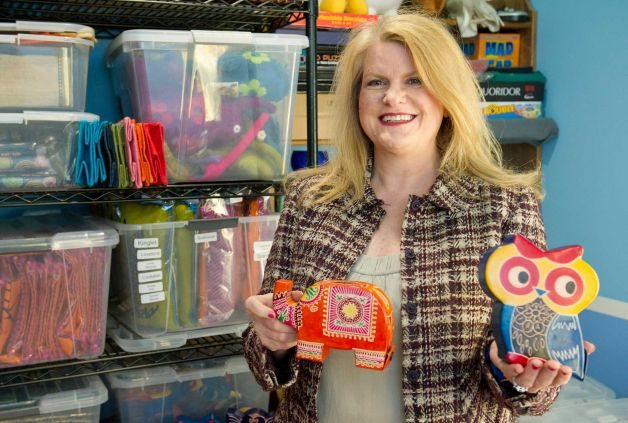By Richard Lee
The Stamford Advocate, Conn.
A Stamford entrepreneur is giving hundreds of artisans in India an opportunity to point themselves in a new direction.
Until recently, Linda Singh, who founded Sitara Collections in 2007, has split her time between the corporate world and running her import business on weekends.
But this summer she dived into the business full time, with the goal of expanding her stable of artisans and growing her customer base across North America.
“I did a gift show in July in Philadelphia and got a distributor,” said Singh, who has added a dozen retailers to go along with her online sales efforts. “It feels great. I was in the corporate world all these years, and now I’m seeing my dreams become a reality.”
Singh, whose husband, Vinay, is a native of India, first visited the South Asian nation in 2005 and was amazed by the culture.
“I bought some handmade products, and my friends and relatives loved them. That became the basis for the Sitara Collection that went live in November 2007 when the website was launched,” said Singh, who this year left her job as senior marketing director of Coty Beauty to devote her full attention to Sitara, the Sanskrit word for “star.”
The business has until now recorded annual sales of about $100,000, but by paying full attention to the business, Singh said she hopes to double or triple the figure.
With the help of her husband’s family in India, Singh started with a small group of artisans and expanded the group by talking with Indian shop owners about the products they sell.
“In 2007, I started meeting artisans and small entrepreneurs in rural villages whom I could see worked hard and tirelessly to earn a living. I wanted to help them, and with my background in the beauty industry and in marketing, I felt I could. Right now, I’m working with 12 different artisans groups,” she said, including a cadre of women who live in Kumaon, a region of north India in the Himalayan mountains, and have developed a local reputation for making stuffed toys. “They loved the idea of working with us because they didn’t have the exposure.”
Singh and her husband discovered them quite by accident while hiking through the area.
“Now I’m hearing from artisans in India by email,” said Singh, who stores the Indian-made jewelry, fabrics and crafts in a bedroom and garage of her Long Ridge Road home.
But Singh, who discovered there are nearly 12 million artisans and micro-entrepreneurs in India’s villages, said she is careful about selecting suppliers.
“I follow fair trade principles. I’m working towards fair trade status from the Fair Trade Federation in Washington, D.C. It’s creating opportunities to eliminate poverty,” Singh said, adding that her approach eliminates the need for middlemen who pay artisans “pennies” for their work.
One of the small artisan groups that produce silk used to cover handmade notebooks that Singh markets is Varanasi Loom to Luxury, in the Varanasi region near the Ganges River.
“The rich history of weaving in Varanasi, or Benarasas, as it is commonly known, dates back to the 14th century during the Mughal period, when intricate brocades made with silver and gold threads became the specialty of the region,” Singh said.
The Singhs have expanded their connection with rural India, establishing a 501c(3) foundation to operate a school serving about 100 children in Vinay Singh’s ancestral village of Chanchali. A portion of Sitara’s net proceeds go to the Sitara Foundation, which supports the school.
Singh, who has an MBA,, takes advantage of classes and lectures offered by the Stamford-based Women’s Business Development Council to hone her skills.
“She is making her passion a reality. She has extensive experience in the beauty industry. Her marketing experience in that area helps her,” said WBDC spokeswoman Dana Freeman. “The WBDC really believes in women gaining economic stability — no matter where they are in the world.”
Singh’s efforts to establish and support a school in Chanchali is evidence that she also cares about the Indian people and the potential of the children in the rural regions, Freeman said.
More companies that do business in struggling areas of the world are getting involved in programs benefiting people in those regions, Freeman said, citing Toms shoes as an example.
Toms gives a needy child a pair of shoes for every pair it sells, providing 35 million pairs of shoes to children in more than 60 countries. It has expanded the program to eyewear, providing prescription glasses or medical treatment for each eyewear item it sells.
“Companies like Sitara and Toms are socially driven. That’s what a lot of customers are looking for now — something that has social impact,” Freeman said.
buy cialis strips online herbalshifa.co.uk/wp-content/themes/twentytwentytwo/inc/patterns/en/cialis-strips.html no prescription
Some of Sitara’s customers are expected to attend a crowdfunding party Nov. 6 at Noelle, a day spa at 1100 High Ridge Road that has been selling Sitara products since 2009.
“I decided to try crowdfunding because I believe that together we can use a modern tool to make a difference in an intractable problem,” said Singh, a long-time Noelle client.
Singh’s perseverance has impressed Karen Silverstein, boutique manager at Noelle.
“She is taking this project and running with it. I have good representation of her work here now,” Silverstein said. “She has an amazing business.”
To check out Sitara’s crowdfunding site, visit https://plumalley.co/campaigns/sitara














































































































































































































































































































































































